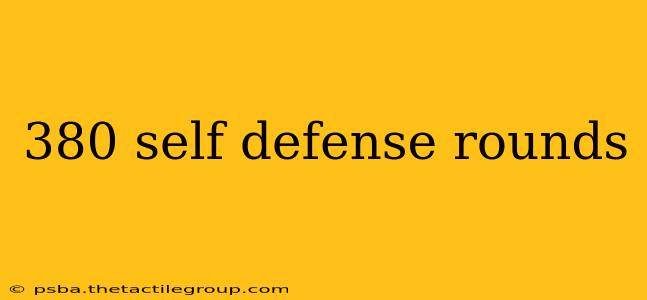Choosing the right ammunition for self-defense is a critical decision, and for those carrying a .380 ACP pistol, the selection process deserves careful consideration. This guide explores various aspects of .380 self-defense rounds, helping you make an informed choice based on your needs and firearm.
Understanding .380 ACP Ammunition
The .380 ACP (Automatic Colt Pistol) cartridge, also known as 9mm Kurz (short), is a popular choice for concealed carry due to its relatively small size and manageable recoil. However, its smaller size compared to larger calibers like 9mm or .45 ACP means that ammunition selection becomes even more crucial for effective self-defense.
Key Factors to Consider When Choosing .380 Self-Defense Rounds:
-
Stopping Power: This refers to the ability of a round to incapacitate an attacker. While .380 ACP has limitations compared to larger calibers, choosing ammunition designed for maximum stopping power is essential. Factors contributing to stopping power include bullet weight, design, and velocity.
-
Penetration: Sufficient penetration is necessary to reach vital organs and neutralize the threat. Over-penetration, however, poses a risk to bystanders, making this a crucial balance to consider.
-
Expansion: Many self-defense rounds are designed to expand upon impact, increasing their diameter and thus their stopping power. This expansion is crucial for maximizing energy transfer to the target. Hollow-point bullets are a common choice for their expansion capabilities.
-
Accuracy and Reliability: Choosing ammunition that consistently feeds and fires reliably in your specific firearm is paramount. Test your chosen ammunition thoroughly to ensure reliable function.
-
Personal Preferences and Legal Considerations: Your individual comfort level and local laws regarding ammunition types should also guide your decision.
Types of .380 Self-Defense Ammunition:
Several types of .380 ACP ammunition cater to self-defense needs. Each has its own advantages and disadvantages:
1. Hollow Point Rounds:
- Pros: Generally offer good expansion and stopping power while minimizing over-penetration.
- Cons: Can be more prone to malfunctioning in certain firearms than full metal jacket rounds. Performance can vary significantly depending on the specific hollow point design.
2. Jacketed Hollow Point (JHP):
- Pros: A popular and widely available choice offering a balance between expansion and penetration.
- Cons: Still a possibility of malfunctions depending on firearm and design.
3. Full Metal Jacket (FMJ):
- Pros: High penetration, reliable functioning, and generally less expensive.
- Cons: Typically does not expand, potentially leading to less stopping power and increased risk of over-penetration. Generally NOT recommended for self-defense.
4. +P and +P+ Ammunition:
- Pros: Higher velocity and energy compared to standard .380 ACP, potentially leading to increased stopping power.
- Cons: Increased recoil and potential for increased wear and tear on your firearm. Always check your firearm's manual to ensure compatibility with +P or +P+ ammunition.
Choosing the Right Ammunition for You:
The best .380 self-defense ammunition is the one that performs reliably in your specific firearm and offers the best balance of stopping power, penetration, and expansion for your needs.
It is crucial to test different types of ammunition at a shooting range to determine what works best for you. This allows you to assess recoil, accuracy, and reliability before relying on the ammunition for self-defense.
Conclusion:
Selecting the right .380 self-defense rounds is a personal decision that should be based on careful consideration of various factors. Prioritizing reliable performance, adequate stopping power, and responsible use is vital. Always consult your firearm's manual and seek expert advice if needed. Remember that carrying a firearm comes with significant responsibility, including regular training and proficiency.

